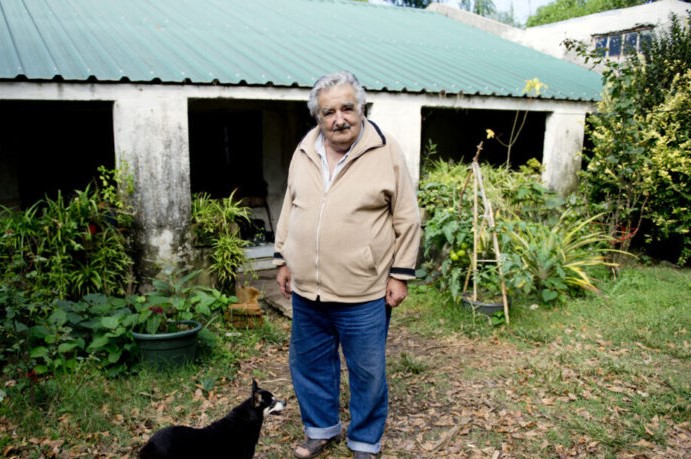by Thomas Sideris
José “Pepe” Mujica, the former president of Uruguay, guerrilla fighter, and philosopher-farmer, passed away on May 13, 2025, at the age of 89. His death marks the end of a life that defied political norms, embodied radical empathy, and left a lasting imprint on global progressive politics. Mujica was not just a politician; he was a symbol—a reminder that leadership does not require luxury, charisma can grow from modesty, and revolution can emerge from inner peace.
A Life Forged in Struggle
Born in Montevideo in 1935 to a poor family of Basque and Italian descent, Mujica was shaped by the harsh inequalities of Latin America. In the 1960s, appalled by the country’s growing economic injustice, he joined the left-wing urban guerrilla group known as the Tupamaros. He participated in bank robberies, political sabotage, and Robin Hood-style redistributions of wealth—acts he never denied.
He was arrested multiple times and, following a failed escape, was captured in 1972 during Uruguay’s authoritarian period. Mujica would spend 14 years in prison, much of it in solitary confinement. His cell was often a hole in the ground. He was denied reading material, light, and contact. Yet, during these years, Mujica began a deep inner transformation. He learned to “speak with ants,” he later said, and developed mental techniques to avoid losing his sanity.
“I learned to live with very little,” he reflected. “When you have nothing, you understand what matters.”
The Philosopher President
After democracy returned to Uruguay in 1985, Mujica entered politics, co-founding the Movimiento de Participación Popular, which became part of the Broad Front coalition. By 2005, he was Minister of Agriculture. In 2009, he ran for president and won. The former guerrilla had become the head of state.
What made Mujica remarkable was not just what he did as president (2010–2015), but how he did it. He refused to move into the presidential palace. He kept driving his old Volkswagen Beetle, lived on his flower farm with his wife and three-legged dog Manuela, and donated 90% of his salary to charities.
Under his leadership, Uruguay legalized abortion, same-sex marriage, and cannabis production, becoming a progressive beacon in Latin America. Mujica treated these issues not as ideological trophies, but as extensions of human dignity.
“I’m called the poorest president,” he once told Al Jazeera. “I don’t feel poor. Poor are those who need too much.”
Unknown and Untold Moments
· The Great Escape (1971): Mujica took part in a legendary prison break where 106 Tupamaros escaped through a tunnel dug beneath Punta Carretas prison—an event orchestrated from under the guards’ noses. Mujica himself was recaptured soon after, but the operation became mythologized in Uruguay’s collective memory.
· The Ant Whisperer: During solitary confinement, Mujica studied insects in his cell. He once described developing an entire mental “library” of philosophies he would reconstruct in his head—meditations on Stoicism, Buddhism, and Marxism—with only his memory and introspection as tools.
· Guanatanamo Welcome (2014): Mujica famously offered asylum to six prisoners released from Guantanamo Bay who had no country willing to accept them. He did it quietly, without fanfare, out of principle. “They deserve a life,” he said.
· Secret Diplomatic Messages: According to aides, Mujica maintained private channels with Evo Morales and Lula da Silva during U.S. trade negotiations, warning against what he called “economic recolonization.” His diplomatic style was humble but sharp—he negotiated with logic, not bluster.
· His Final Act of Rebellion (2025): After cancer spread to his liver, Mujica refused to prolong his life artificially. “I will not turn death into a product,” he reportedly told his doctors. He died at home on his farm, in the company of his wife, Lucía Topolansky.
Legacy of a Quiet Giant
Mujica’s funeral in Montevideo drew over 100,000 mourners. Latin American leaders praised him, and tributes poured in from around the world. But true to form, Mujica had requested a modest, non-state burial and for his ashes to be scattered on his land.
He left no autobiography, no foundation, no monuments. His words, however, continue to resonate:
“We were born only to live, not to be slaves of the market.”
In an age of spectacle, José Mujica offered stillness. In a world driven by ambition, he preached simplicity. And in politics, where self-interest often dominates, he practiced sacrifice.
A Rebel for the Soul
Pepe Mujica did not preach revolution from a throne, but from the soil he worked with his hands. His legacy is not merely political—it is spiritual. In the quiet rhythm of a man who lived what he believed, the world glimpsed a different kind of power: one without greed, without ego, without fear.
In death, as in life, Mujica reminds us of the nobility of modesty and the strength of conviction. A rebel until the end—not with a rifle, but with a flower in hand.
Don’t miss the special episode of the radio documentary series “Uguarded Passage” dedicated to Pepe Mujica. The episode was broadcast live on Voice of Greece on Friday, May 25, 2025.
